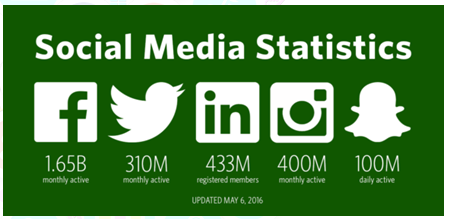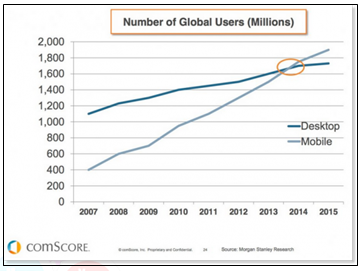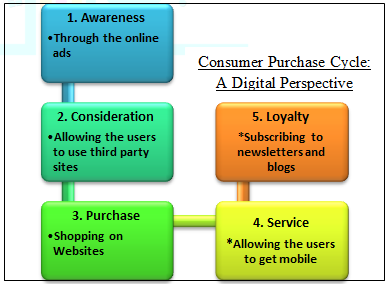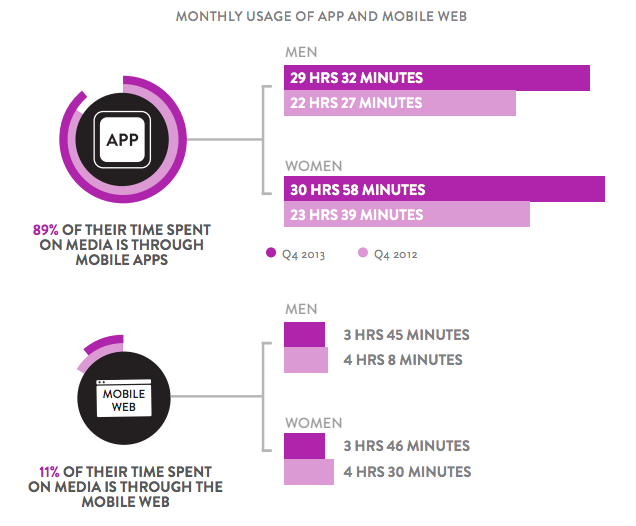Leveraging Social Media and Web Analytics for Business Growth
“A brand is no longer what we tell the customer it is – it is what the customers tell each other it is.” – Scott Cook, Director E-Bay
The above quote from Mr. Cook clearly tells us the dramatic shift that the social media has brought into our lives. Social Media has become one of the most important touch points in today’s businesses.
Social Media in its most simple terms can be defined as a platform which connects people across the world. Technically, social media consists of the websites and applications that allow users to create and share content or to participate in social networking. Considering the number of users that currently leverage the power of social media for networking, it has provided the marketers with an important domain to gain consumer insights. More than 90% of marketers use social media in their campaign.

According to Chris Snider Design statistics on social media for May 6, 2016, there are around 1.65 billion monthly active Facebook users in the world. The statistics for other social media platforms are given in the figure above
Looking at these statistics, the power of social media can be understood very clearly. The question arises as to how and in what ways these statistics are important for the businesses around the world. The reasons are as follows:
- Increases the visibility of brands:- Believe it or not, in this current arena of social media marketing, it is extremely important to keep the accounts of Facebook, Twitter etc. updated because there are millions of users sharing, liking, commenting and following your brand. An average adult globally spends 40 min approximately on Facebook and 21 minutes on Instagram. Therefore, social media helps in brand visibility and creates a differentiation factor against competitors.
- Helps companies reach specific demographics:- Social media provides you with the customizing capabilities and provides you valuable insights about the consumers through the analytics regarding their age, gender, geography. Through this, the businesses can ta
 rget the specific consumers. Pinterest, Instagram allows the companies to understand the common interests a particular group of consumers are sharing. Accordingly they can target them through their offerings.
rget the specific consumers. Pinterest, Instagram allows the companies to understand the common interests a particular group of consumers are sharing. Accordingly they can target them through their offerings. - Mobile Visibility:- Mobile marketing is one of the most widely used marketing nowadays. According to Morgan Stanley Research of 2014-15, there are around 1900 million mobile users around the world. Moreover it is growing at almost 58% year over year.
- Keeps track of what is being talked about them:- Social media is a very good source to understand as to what the customers are talking about the brands and businesses. Whether the newly launched product is performing better or not; the customer complaints are being resolved or not; are the customers behaving in a positive way or negative way towards the brand, all these can be understood through the social media.
- Advertising platform:– Social media provides an important platform to showcase the ads in the realtime to the users.
- Increase the Leads:- The leads generated can be increased through the effective engagement on social media which can be brought by ads.
- Conversions:- Websites like e-commerce, banks, movie bookings can increase their conversion by advertising on social media owing to the immense reach it has.
- App Engagement:– Ola, Uber often provide offer of the day to drive the customer engagement.
- Events, Responses:- The events, concerts can bring in more audience by creating the event on Social media.
- Engaging with the influencers:- Influencer marketing is a viral concept nowadays and business target these influencers to engage with the audience efficiently as the followers of the influencer keenly understand as to what they are saying. If they say good, followers are going to go ahead with their views.
- Professional Networks:- Websites like Linkedin offer the users to broaden their professional networks with the companies and job profiles they are looking for.
- Amplifies the reach:- It is difficult for the businesses to reach the audience individually and hence social media provides them with a huge range of users to understand and target accordingly.
- Competitor Dynamics:- As is said earlier that 90% of the marketers use social media and hence they can very well get to know as to what their competitor is offering and what strategy they are using. Sometimes the competitors are blocked but in other cases they can be effectively traced.
- Managing PR crisis:- This is one of the most important use of social media. If anyone has bad mouthed or has spoken evil about that particular brand, then the Public Relations team in the business can easily track the issue and engage with the customer to resolve it timely so that it doesn’t spread further.
Web Analytics:-
Web Analytics is nothing but understanding anything that is happening around us. In today’s consumer highway, there are two touch points i.e. physical and digital. At each and every stage in the consumer purchase cycle, the importance of web analytics can be seen as it helps the businesses understand the consumer mindset.
Web Analytics is defined as the measurement, collection, analysis and reporting of internet data for the purposes of understanding and optimizing the web usage.
1. Results of whatever you have done:- It doesn’t matter as to what strategy you have  employed for your web usage. The results will tell you if you are on the right track or not.It gives following information to businesses:
employed for your web usage. The results will tell you if you are on the right track or not.It gives following information to businesses:
2. Improvement and way forward:- If you are on the right track, then what else you can do and if you are not, then the improvements to be employed can be easily told to you by the web analytics.
Framework for Web Analytics:-
- Determine the needs:- Firstly, businesses should understand as to why they need web analytics.
- Identify goals: The goals should be clearly defined. Example:- Achieving 85% reach on social media.
- Define metrics:- This is about how much you have done and how much you will employ from henceforth to achieve the target or goals.
- Collect data:- The data should be collected about whether your activities online are working or not.
- Record Baseline:- The baseline for comparison should be clearly defined.
- Test Improvement Strategies:- The strategies should be tested after comparison with the baseline.
- Implement Improvements:- The improvements through the analytics result should be implemented.
- Measure Results:- Finally, we have to measure the results with respect to the baseline.
Why Web Analytics:-
- Performance Measurement:- You can do previous versus post analysis and now what you have to do. Hence businesses can easily understand the performances and can devise further course of action.
- Visitor Data: The data gathered background about the psychographics, demographics, geographies etc. about the user are a valuable piece of information for the businesses.
- Marketing Optimization:- Whatever activity the business is doing, is it contributing to the sales or not in an efficient manner can be understood by web analytics tools like Google Analytics and Hoot Suite.
- Content Optimization:- In the end, it is all about the content you put in front of the customers. The content a business puts should be optimized so that it drives large sources of sales and revenue.
- Bounce Rates:- Businesses can easily track the bounce rates as to from where the user has exited from a particular website and thereby move ahead to find reasons for it.
- Marketing Clouds:- Platforms like salesforce.com allows you to see the picture at a glance on the dashboards about what all is the result of your activities on the web.
- Improving SEO: The search engine optimization can be maximized through web analytics.
- Social Media Analytics:- Social media analytics is the practice of gathering data from the blogs and social media websites and analyzing them to make business decisions. It allows business to help improve the customer services.
To conclude, social media and web analytics are not just important but indispensable tools for the businesses to survive in today’s competing era. As Erik Qualman said, “We don’t have a choice on whether we do social media, the question is how well we do it.” Hence, it has become a necessity for the businesses to leverage social media and web analytics prudently to become remarkable in the future.


